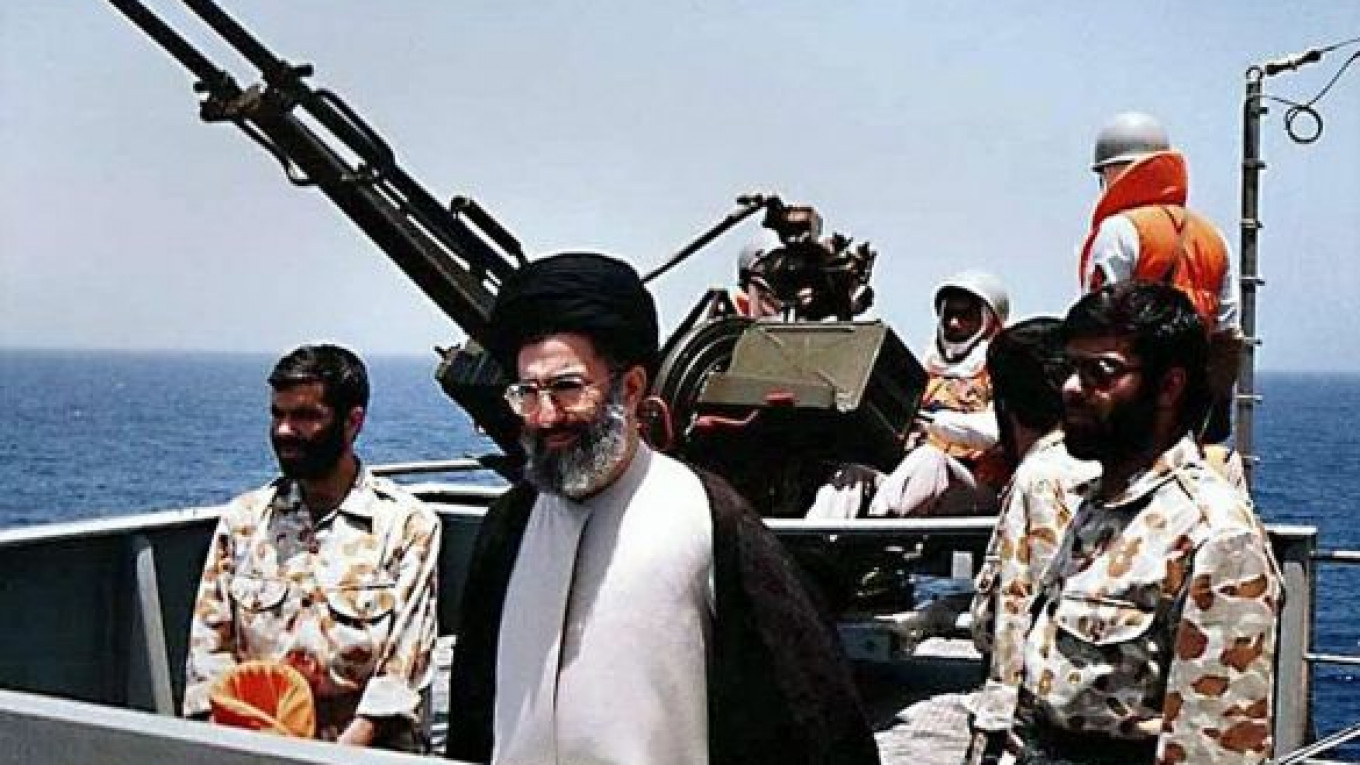Russia fears Israel will push the United States into a military conflict with Iran, which could retaliate by blocking oil shipments from the Gulf, a confidant of Prime Minister Vladimir Putin said.
"There is a likelihood of military escalation of the conflict, toward which Israel is pushing the Americans," Nikolai Patrushev, who heads the Kremlin's Security Council, told Interfax.
Patrushev, a former head of the main successor to the Soviet-era KGB, said Tehran could respond by blocking the Strait of Hormuz between Oman and Iran, through which 35 percent of the world's seaborne-traded oil passes.
"It cannot be ruled out that the Iranians will be able to carry out their threat to shut off exports of Saudi oil through the Strait of Hormuz if faced with military actions against them," Patrushev said in an interview published Thursday.
Tension over Iranian uranium enrichment, which has moved to a mountain bunker better protected from possible air strikes, has raised fears for world oil supplies and even of war.
Iran says its nuclear program is peaceful, while Western powers believe it has military aims. Israel, which sees an Iranian atom bomb as a threat to its existence, is willing to attack Iranian nuclear sites with or without U.S. backing.
However, Patrushev said there was still no proof that Iran was on the brink of creating nuclear weapons.
"We have heard talk about Iran creating an atomic bomb by next week for many years," he said, adding that the United States was trying to topple Iran's leadership using "all available means" to make the country into "a loyal partner."
Russia, the world's biggest energy producer, opposes further UN Security Council sanctions over Tehran's nuclear program and has sharply criticized U.S. and European Union sanctions.
The United States has said it would use force if Iran carried out its threat to block the strait and moved a new aircraft carrier strike group to the Arabian Sea this week.
Patrushev also said Russia received information that NATO members and some Persian Gulf countries are preparing military intervention in Syria.
Turkey, a NATO member, may play a key role, working with the United States on a possible no-fly zone to protect Syrian rebels, Patrushev said.
"We are receiving information that NATO members and some Persian Gulf states, working under the 'Libyan scenario,' intend to move from indirect intervention in Syria to direct military intervention," he said.
U.S. Secretary of State Hillary Clinton said yesterday that the Arab League monitoring mission in Syria should end after failing to deter the government's 10-month campaign of violence against dissidents.
Turkey's Foreign Ministry and NATO's press service in Brussels did not immediately respond to requests for comment.
Russia argues that United Nations-sanctioned bombing of Libya by NATO to protect civilians was used to bring about regime change and that Western governments are trying to repeat that scenario in Syria.
The West is putting pressure on Syria because the country refuses to break off its alliance with Iran and not for repressing the opposition, Patrushev said.
"This time, it won't be France, Britain and Italy that will provide the main strike forces, but perhaps neighboring Turkey, which was until recently on good terms with Syria and is a rival of Iran with immense ambitions," he said.
Syrian President Bashar Assad rejected calls for his resignation on Jan. 10, accusing "foreign conspiracies" of aiming to divide his country. Unrest in Syria since March 2011 has claimed more than 5,000 lives, according to the United Nations.
The Arab League imposed sanctions on Syria on Nov. 27. Russia and China have blocked efforts by the United States and the European Union for the UN Security Council to condemn the crackdown.
Russia, which has a naval base in Syria and sells weapons to the country, is more concerned that Islamist radicals may come to power, said Irina Zvyagelskaya, a Middle East analyst at the Academy of Sciences in Moscow.
While Russia would block any effort to seek UN approval for a no-fly zone in Syria thanks to its veto-wielding power as a permanent member of the Security Council, Western nations and their allies may form a coalition like they did for the U.S.-led invasion of Iraq in 2003, Zvyagelskaya said by telephone Thursday.
Russia may have obtained intelligence about Western military plans in Syria or may be sending a signal that it will actively oppose any such efforts, said Fyodor Lukyanov, an analyst at the Council on Foreign and Defense Policy in Moscow.
"After the Libyan experience, Russia will do everything to stop this scenario from happening," he said in a phone interview. "Syria is much more important than Libya from Russia's point of view."
(Reuters, Bloomberg)
A Message from The Moscow Times:
Dear readers,
We are facing unprecedented challenges. Russia's Prosecutor General's Office has designated The Moscow Times as an "undesirable" organization, criminalizing our work and putting our staff at risk of prosecution. This follows our earlier unjust labeling as a "foreign agent."
These actions are direct attempts to silence independent journalism in Russia. The authorities claim our work "discredits the decisions of the Russian leadership." We see things differently: we strive to provide accurate, unbiased reporting on Russia.
We, the journalists of The Moscow Times, refuse to be silenced. But to continue our work, we need your help.
Your support, no matter how small, makes a world of difference. If you can, please support us monthly starting from just $2. It's quick to set up, and every contribution makes a significant impact.
By supporting The Moscow Times, you're defending open, independent journalism in the face of repression. Thank you for standing with us.
Remind me later.






